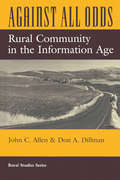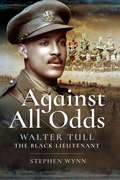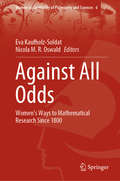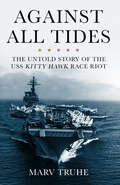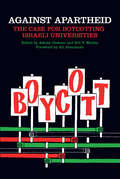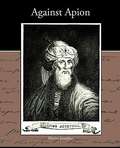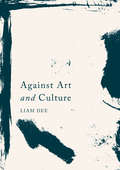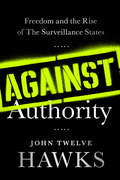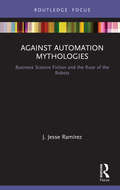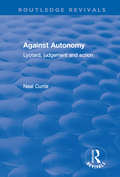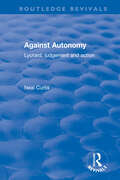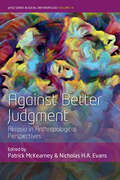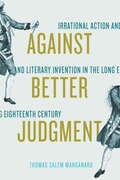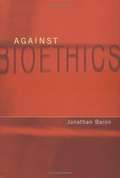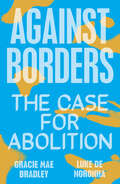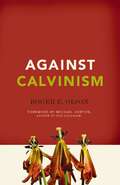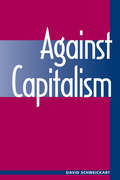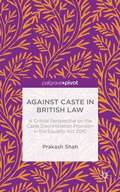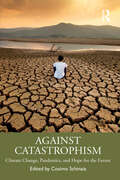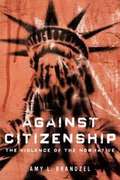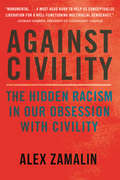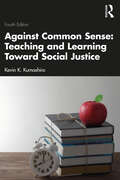- Table View
- List View
Against All Odds: Rural Community In The Information Age
by John C AllenThe authors' model orients this community in the vortex of contemporary forces, pointing up, for example, the need for face-to-face interaction among residents versus the larger society's demand for electronic communication. With increasing conflicts between the culture of rural communities and that of the outside world" occurring, small towns all over the United States are losing their businesses, their doctors, and their sense of community. Yet the town described in this study is thriving. Against All Odds identifies pride, determination, and a sense of belonging that must be nurtured,and the local organization that binds all of these factors together,in order to keep a small town alive in the face of powerful disruptive forces. Not since Vidich and Bensman's landmark Small Town in Mass Society has such a thoughful examination of a contemporary rural community been available.
Against All Odds: The Struggle for Racial Integration in Religious Organizations
by Brad Christerson Michael Oluf Emerson Korie Little EdwardsReligious institutions are among the most segregated organizations in American society. This segregation has long been a troubling issue among scholars and religious leaders alike. Despite attempts to address this racial divide, integrated churches are very difficult to maintain over time. Why is this so? How can organizations incorporate separate racial, ethnic, and cultural groups? Should they? And what are the costs and rewards for people and groups in such organizations? Following up on Michael O. Emerson and Christian Smith's award-winning Divided by Faith, Against All Odds breaks new ground by exploring the beliefs, practices, and structures which allow integrated religious organizations to survive and thrive despite their difficulties. Based on six in-depth ethnographies of churches and other Christian organizations, this engaging work draws on numerous interviews, so that readers can hear first-hand the joys and frustrations which arise from actually experiencing racial integration. The book gives an inside, visceral sense of what it is like to be part of a multiracial religious organization as well as a theoretical understanding of these experiences.
Against All Odds: Walter Tull the Black Lieutenant
by Stephen WynnWalter Tull would have been a remarkable individual no matter when he had been born, but to achieve what he did, during the time that he did, makes him even more remarkable. He was an orphan at just six years of age, and despite not wanting to, his step mother, Clara, had no choice but to place him and his elder brother, Edward, in to a children's home in the East End of London. As neither Walter or Edward had ever traveled outside of Folkestone before, the upheaval must have come as quite a shock. Two years after entering the home, Walter and Edward were split up when Edward was adopted and went to live in Glasgow.Walter's sporting prowess saw him play for top local amateur side, Clapton Football club, signing for them in 1908, but it was to be a short lived affair, as by the following year he had signed as a professional for the prestigious Tottenham Hotspur Football Club, making his first team debut against Manchester United.In October 1911 Walter was transferred to Northampton Town Football Club, where he would go on to play over one hundred first team games, before the First World War brought a premature end to his career as a professional footballer. With the outbreak of war, Walter wasted no time enlisting in the British Army, initially as a Private in the newly formed 17th (Football) Battalion, Middlesex Regiment. Further promotions followed and in no time at all he had reached the rank of Sergeant.He was put forward for a commission and passed out as a 2nd Lieutenant on 29 May 1917. He went on to become the first black officer in the British Army, to lead white troops in to battle, and was fondly regarded by the men who served under him.Walter was killed in action whilst leading his men in a counter attack against German defensive positions on Monday 25 March 1918. He died a hero. He was well liked and respected by all who knew him. Like many men of his generation his life was cut short for the greater good whilst in the service of his country, so that others might prevail.
Against All Odds: Women’s Ways to Mathematical Research Since 1800 (Women in the History of Philosophy and Sciences #6)
by Eva Kaufholz-Soldat Nicola M. R. OswaldThis book presents an overview of the ways in which women have been able to conduct mathematical research since the 18th century, despite their general exclusion from the sciences. Grouped into four thematic sections, the authors concentrate on well-known figures like Sophie Germain and Grace Chisholm Young, as well as those who have remained unnoticed by historians so far. Among them are Stanisława Nidodym, the first female students at the universities in Prague at the turn of the 20th century, and the first female professors of mathematics in Denmark. Highlighting individual biographies, couples in science, the situation at specific European universities, and sociological factors influencing specific careers from the 18th century to the present, the authors trace female mathematicians’ status as it evolved from singular and anomalous to virtually commonplace.The book also offers insights into the various obstacles women faced when trying to enter perhaps the “most male” discipline of all, and how some of them continue to shape young girls’ self-perceptions and career choices today. Thus, it will benefit scholars and students in STEM disciplines, gender studies and the history of science; women in science, mathematics and at institutions, and those working in mathematics education.
Against All Tides: The Untold Story of the USS Kitty Hawk Race Riot
by Marv TruheSimmering racial tensions inflamed by discriminatory punitive measures sparked a violent confrontation aboard the USS Kitty Hawk while it was engaged in air strikes off the coast of North Vietnam. The US Navy charged Black sailors with rioting and assaults on White sailors in an incident referred to as a race riot, while totally ignoring violent unprovoked assaults committed by White sailors and Marines. Author Marv Truhe was a Navy JAG defense lawyer seeking justice for the accused Black sailors. Truhe possesses one of the most complete collections, personal or institutional, of original source documents of the Kitty Hawk incident and its legal aftermath—trial transcripts, investigation reports, hundreds of sworn statements and medical reports, federal court pleadings, and case files and witness interviews. How could virtually all official and unofficial accounts of the incident have placed blame for the incident solely on twenty-three Black sailors? How could they have been subjected to blatant racial injustices without their story being told until now? It is time to reveal the uncomfortable answers to these questions and expose the injustices perpetrated against these twenty-three young men.
Against Apartheid: The Case for Boycotting Israeli Universities
by Ashley Dawson Bill V. MullenFocusing on the complicity of Israeli universities in maintaining the occupation of Palestine, and on the repression of academic and political freedom for Palestinians, Against Apartheid powerfully explains why scholars and students throughout the world should refuse to do business with Israeli institutions. This rich collection of essays is a handbook for scholars and activists.
Against Apion
by Flavius JosephusJosephus, soldier, statesman, historian, was a Jew born at Jerusalem about 37 CE. A man of high descent, he early became learned in Jewish law and Greek literature and was a Pharisee. After pleading in Rome the cause of some Jewish priests he returned to Jerusalem and in 66 tried to prevent revolt against Rome, managing for the Jews the affairs of Galilee. In the troubles which followed he made his peace with Vespasian. Present at the siege of Jerusalem by Titus, he received favours from these two as emperors and from Domitian and assumed their family name Flavius. He died after 97. As a historical source Josephus is invaluable. His major works are: History of the Jewish War, in seven books, from 170 BCE to his own time, first written in Aramaic but translated by himself into the Greek we now have; and Jewish Antiquities, in twenty books, from the creation of the world to 66 CE. The Loeb Classical Library edition of the works of Josephus also includes the autobiographical Life and his treatise Against Apion.
Against Apion
by Flavius JosephusFlavius Josephus was a first-century Jewish historian and apologist of priestly and royal ancestry. He recorded the destruction of Jerusalem in AD 70. His works give an important insight into first-century Judaism. <P> <P> Josephus educated Gentiles and insisted on the Jewish compatibility with cultured Graeco-Roman thought. Josephus's two most important works are The Jewish War (c. 75) and Antiquities of the Jews (c. 94). Against Apion was a polemical work written as a defense of Judaism as a classical religion and philosophy, stressing its antiquity against what he perceived as more recent traditions of the Greeks. Some anti-Semitic allegations attributed by Josephus to Apion (who Josephus states is not Greek), and myths as old as Manetho's are exposed. Josephus also explains which books he views as Jewish scriptures.
Against Art and Culture
by Liam DeeOffering a negative definition of art in relation to the concept of culture, this book establishes the concept of 'art/culture' to describe the unity of these two fields around named-labour, idealised creative subjectivity and surplus signification. Contending a conceptual and social reality of a combined 'art/culture' , this book demonstrates that the failure to appreciate the dynamic totality of art and culture by its purported negators is due to almost all existing critiques of art and culture being defences of a 'true' art or culture against 'inauthentic' manifestations, and art thus ultimately restricting creativity to the service of the bourgeois commodity regime. While the evidence that art/culture enables commodification has long been available, the deduction that art/culture itself is fundamentally of the world of commodification has failed to gain traction. By applying a nuanced analysis of both commodification and the larger systems of ideological power, the book considers how the 'surplus' of art/culture is used to legitimate the bourgeois status quo rather than unravel it. It also examines possibilities for a post-art/culture world based on both existing practices that challenge art/culture identity as well as speculations on the integration of play and aesthetics into general social life. An out-and-out negation of art and culture, this book offers a unique contribution to the cultural critique landscape.
Against Authority: Freedom and the Rise of the Surveillance States
by John Twelve HawksIn both his novels and in his 2005 essay, How We Live Now, John Twelve Hawks was one of the first authors to warn us about the growing power of surveillance technology. Now he has written a personal and controversial book that shows how our lives are watched and analyzed by governments and international corporations. In a world in which our actions can be monitored by a computerized grid of social control, is there anything we can do to defend our freedom?
Against Automation Mythologies: Business Science Fiction and the Ruse of the Robots
by J. Jesse RamirezInspired by Roland Barthes’s practice of "semioclasm" in Mythologies, this book offers a "technoclasm"; a cultural critique of US narratives, discourses, images, and objects that have transformed the politics of automation into statements of fact about the "rise of the robots". Treating automation as an ensemble of technologies and science fictions, this book foregrounds automation’s ideologies, exaggerations, failures, and mystifications of the social value of human labor in order to question accepted and prolific automation mythologies. Jesse Ramirez offers a study of automation that recognizes automation as a technosocial project, that uses the tools of cultural studies and history to investigate the narratives and ideologies that often implicitly frame the automation debate, and that concretely and soberly assesses the technologies that have made the headlines. The case studies featured include some of the most widely cited and celebrated automatic technologies, such as the Baxter industrial robot, the self-driving car, and the Watson AI system. An ideal resource for anyone interested in or studying emerging technology and society, automation, Marxist cultural theory, cultural studies, science fiction studies, and the cultural history of technology.
Against Autonomy
by Sarah ConlySince Mill's seminal work On Liberty, philosophers and political theorists have accepted that we should respect the decisions of individual agents when those decisions affect no one other than themselves. Indeed, to respect autonomy is often understood to be the chief way to bear witness to the intrinsic value of persons. In this book, Sarah Conly rejects the idea of autonomy as inviolable. Drawing on sources from behavioural economics and social psychology, she argues that we are so often irrational in making our decisions that our autonomous choices often undercut the achievement of our own goals. Thus in many cases it would advance our goals more effectively if government were to prevent us from acting in accordance with our decisions. Her argument challenges widely held views of moral agency, democratic values and the public/private distinction, and will interest readers in ethics, political philosophy, political theory and philosophy of law.
Against Autonomy: Lyotard, Judgement and Action (Routledge Revivals)
by Neal CurtisThis title was first published in 2001: Against Autonomy reassesses Jean-Francois Lyotard's contribution to philosophy and theory, and explores how his work challenges the privileged position of the principle of autonomy in contemporary liberal democratic thinking, as seen in such diverse thinkers as Rawls, Rorty and Fukuyama. Curtis argues that the political models autonomy legitimates are inadequate for thinking justice. Such models invariably promote self-legislation as the ground of freedom turning the subject away from its prior constitution by, and responsibility for, the Other. He explores Lyotard's reading of Kant as well as his responses to Levinas and Heidegger in order to rethink the political. Developing a regulative Idea based on new understandings of heteronomy and an-archy Curtis shows how Lyotard's argument that there are no criteria for justice does not mean judgement and action fall prey to decisionism and relativism, but that this lack of criteria commits us to a renewed sensitivity to events. Examining Lyotard's work in relation to Arendt's writings on the vita activa, this book explores themes of community, communication and action, suggesting how Lyotard's work calls for an alternative conception of political space. This book will be of particular interest to those studying communitarianism, liberalism, anarchism, post-structuralism and postmodernism, particularly within the context of political philosophy, ethics, and political and social theory. Neal Curtis is Lecturer in Communication Studies, Anglia Polytechnic University at Cambridge, UK
Against Autonomy: Lyotard, Judgement and Action (Routledge Revivals)
by Neal CurtisThis title was first published in 2001: Against Autonomy reassesses Jean-Francois Lyotard's contribution to philosophy and theory, and explores how his work challenges the privileged position of the principle of autonomy in contemporary liberal democratic thinking, as seen in such diverse thinkers as Rawls, Rorty and Fukuyama. Curtis argues that the political models autonomy legitimates are inadequate for thinking justice. Such models invariably promote self-legislation as the ground of freedom turning the subject away from its prior constitution by, and responsibility for, the Other. He explores Lyotard's reading of Kant as well as his responses to Levinas and Heidegger in order to rethink the political. Developing a regulative Idea based on new understandings of heteronomy and an-archy Curtis shows how Lyotard's argument that there are no criteria for justice does not mean judgement and action fall prey to decisionism and relativism, but that this lack of criteria commits us to a renewed sensitivity to events. Examining Lyotard's work in relation to Arendt's writings on the vita activa, this book explores themes of community, communication and action, suggesting how Lyotard's work calls for an alternative conception of political space. This book will be of particular interest to those studying communitarianism, liberalism, anarchism, post-structuralism and postmodernism, particularly within the context of political philosophy, ethics, and political and social theory. Neal Curtis is Lecturer in Communication Studies, Anglia Polytechnic University at Cambridge, UK
Against Better Judgment: Akrasia in Anthropological Perspectives (WYSE Series in Social Anthropology #14)
by Patrick McKearney Nicholas H.A. EvansAnthropologists have long explained social behaviour as if people always do what they think is best. But what if most of these explanations only work because they are premised upon ignoring what philosophers call 'akrasia' – that is, the possibility that people might act against their better judgment? The contributors to this volume turn an ethnographic lens upon situations in which people seem to act out of line with what they judge, desire and intend. The result is a robust examination of how people around the world experience weaknesses of will, which speaks to debates in both the anthropology of ethics and moral philosophy.
Against Better Judgment: Irrational Action and Literary Invention in the Long Eighteenth Century
by Thomas Salem ManganaroRobinson Crusoe recognizes it is foolish to leave for the open seas; nevertheless, he boards the ship. William Wordsworth of The Prelude sees the immense poetic task ahead of him, but instead of beginning work, he procrastinates by going for a walk. Centering on this sort of intentionally irrational action, originally defined as " akrasia" by the ancient Greeks and "weakness of will" in early Christian thought, Against Better Judgment argues that the phenomenon takes on renewed importance in the long eighteenth century.In treating human minds and bodies as systems and machines, Enlightenment philosophers did not account for actions that may be undermotivated, contradictory, or self-betraying. A number of authors, from Daniel Defoe and Samuel Johnson to Jane Austen and John Keats, however, took up the phenomenon in inventive ways. Thomas Manganaro traces how English novelists, essayists, and poets of the period sought to represent akrasia in ways philosophy cannot, leading them to develop techniques and ideas distinctive to literary writing, including new uses of irony, interpretation, and contradiction. In attempting to give shape to the ways people knowingly and freely fail themselves, these authors produced a new linguistic toolkit that distinguishes literature’s epistemological advantages when it comes to writing about people.
Against Bioethics
by Jonathan BaronGovernments, health professionals, patients, research institutions, and research subjects look to bioethicists for guidance in making important decisions about medical treatment and research.
Against Borders: The Case for Abolition
by Luke de Noronha Gracie Mae BradleyA powerful manifesto for a world without borders from two immigration policy experts and activistsBorders harm all of us: they must be abolished. Borders divide workers and families, fuel racial division, and reinforce global disparities. They encourage the expansion of technologies of surveillance and control, which impact migrants and citizens both. Bradley and de Noronha tell what should by now be a simple truth: borders are not only at the edges of national territory, in airports, or at border walls. Borders are everyday and everywhere; they follow people around and get between us, and disrupt our collective safety, freedom and flourishing. Against Borders is a passionate manifesto for border abolition, arguing that we must transform society and our relationships to one another, and build a world in which everyone has the freedom to move and to stay.
Against Calvinism: Rescuing God's Reputation from Radical Reformed Theology
by Roger E. OlsonCalvinist theology has been debated and promoted for centuries. But is it a theology that should last? Roger Olson suggests that Calvinism, also commonly known as Reformed theology, holds an unwarranted place in our list of accepted theologies. In Against Calvinism, readers will find scholarly arguments explaining why Calvinist theology is incorrect and how it affects God’s reputation. Olson draws on a variety of sources, including Scripture, reason, tradition, and experience, to support his critique of Calvinism and the more historically rich, biblically faithful alternative theologies he proposes. Addressing what many evangelical Christians are concerned about today—so-called “new Calvinism,” a movement embraced by a generation labeled as “young, restless, Reformed” —Against Calvinism is the only book of its kind to offer objections from a non-Calvinist perspective to the current wave of Calvinism among Christian youth. As a companion to Michael Horton’s For Calvinism, readers will be able to compare contrasting perspectives and form their own opinions on the merits and weaknesses of Calvinism.
Against Capitalism
by David SchweickartCapitalism is hegemonic today not because it is the best we fallible humans can do but because it supports, and is supported by, special interests of immense power. This book argues that Economic Democracy, a competitive economy of democratically run enterprises that replaces capitalist financial markets with more suitable institutions, will be more efficient than capitalism, more rational in its growth, more democratic, more egalitarian, and less alienating.Against Capitalism is an ambitious book, drawing on philosophical analysis, economic theory, and considerable empirical evidence to advance its controversial thesis. It examines both conservative and liberal forms of capitalism; it compares Economic Democracy to other models of socialism; and it considers the transition to Economic Democracy from advanced capitalist societies, from economies built on the Soviet model, and from conditions of underdevelopment. The book concludes with some unconventional reflections on historical materialism, ideal communism, and the future of Marxism.
Against Caste in British Law: A Critical Perspective On The Caste Discrimination Provision In The Equality Act 2010
by Prakash ShahThis book discusses the salience of the caste question in UK law. It provides the background to how the caste provision came into the Equality Act 2010 and how it was reinforced in 2013, and analyses the various interests that played a role in getting caste into law.
Against Catastrophism: Climate Change, Pandemics, and Hope for the Future
by Cosimo SchinaiaAgainst Catastrophism explores catastrophism from multiple vantage points and considers the impact of ongoing crisis on individuals.Bringing together contributors from psychoanalysis, economics, anthropology, and gastroenterology, this book explores themes including fossil fuel culture, social movements like Extinction Rebellion, the COVID-19 pandemic, media messaging, and the future of food supply chains. By assessing the value of a constant barrage of information about catastrophes and considering the need for a containing environment, the chapters explore how we can avoid endorsing a closed-off vision of the future and instead unlock possibilities. The book concludes with a discussion of optimism, radical hope, and how we can put forward a new narrative on nature.Against Catastrophism will be of great interest to psychoanalysts, psychologists, psychiatrists, economists, anthropologists, sociologists, food scientists, environmentalists, ecologists, politicians, and communication experts.
Against Citizenship: The Violence of the Normative
by Amy L BrandzelNumerous activists and scholars have appealed for rights, inclusion, and justice in the name of "citizenship." Against Citizenship provocatively shows that there is nothing redeemable about citizenship, nothing worth salvaging or sustaining in the name of "community," practice, or belonging. According to Brandzel, citizenship is a violent dehumanizing mechanism that makes the comparative devaluing of human lives seem commonsensical, logical, and even necessary. Against Citizenship argues that whenever we work on behalf of citizenship, whenever we work towards including more types of peoples under its reign, we inevitably reify the violence of citizenship against nonnormative others. Brandzel's focus on three legal case studies--same-sex marriage law, hate crime legislation, and Native Hawaiian sovereignty and racialization--exposes how citizenship confounds and obscures the mutual processes of settler colonialism, racism, sexism, and heterosexism. In this way, Brandzel argues that citizenship requires anti-intersectionality, that is, strategies that deny the mutuality and contingency of race, class, gender, sexuality and nation--and how, oftentimes, progressive left activists and scholars follow suit.
Against Civility: The Hidden Racism in Our Obsession with Civility
by Alex ZamalinThe first history of racial injustice to examine how civility and white supremacy are linked, and a call for citizens who care about social justice to abandon civility and practice civic radicalismThe idea and practice of civility has always been wielded to silence dissent, repress political participation, and justify violence upon people of color. Although many progressives today are told that we need to be more polite and thoughtful, less rancorous and angry, when we talk about race in America, civility maintains rather than disrupts racial injustice. Spanning two hundred years, Zamalin's accessible blend of intellectual history, political biography, and contemporary political criticism shows that civility has never been neutral in its political uses and impacts. The best way to tackle racial inequality is through "civic radicalism," an alternative to civility found in the actions of Black radical leaders including Frederick Douglass, Harriet Tubman, Ida B. Wells, Martin Luther King Jr., James Baldwin, Malcolm X, and Audre Lorde. Civic radicals shock and provoke people. They name injustice and who is responsible for it. They protest, march, strike, boycott, and mobilize collectively rather than form alliances with those who fundamentally oppose them.In Against Civility, citizens who care deeply about racial and socioeconomic equality will see that they need to abandon this concept of discreet politeness when it comes to racial justice and instead more fully support disruptive actions and calls for liberation, which have already begun with movements like #MeToo, the Dakota Access Pipeline protests, and Black Lives Matter.
Against Common Sense: Teaching And Learning Toward Social Justice
by Kevin K. KumashiroWhat does it mean to teach for social justice? Drawing on his own classroom experiences, leading author and educator Kevin K. Kumashiro examines various aspects of anti-oppressive teaching and learning and their implications for six different subject areas and various grade levels. Celebrating 20 years as a go-to resource for K-12 teachers and teacher educators, this 4th edition of the bestselling Against Common Sense: Teaching and Learning Toward Social Justice features:• An expanded introduction that examines teaching in today’s context of censorship and attacks on diversity, democracy, and teaching truth;• New sections on teacher preparation, social studies, reading and writing, and the arts;• Updated lists of resources in every chapter;• Graphics, teacher responses, and discussion questions to enhance comprehension and help translate theory into practice across the disciplines.Compelling and accessible, the 4th edition of Against Common Sense continues to offer readers the tools they need to begin teaching against their commonsensical assumptions and toward democracy and justice.
